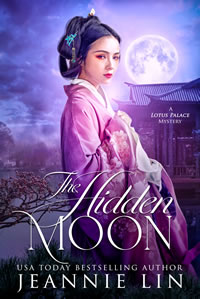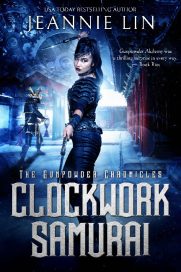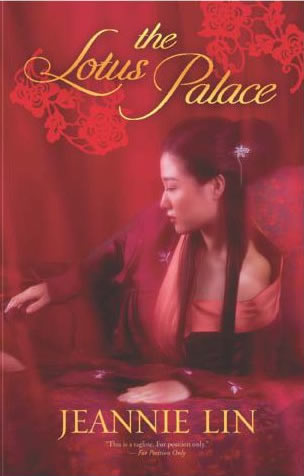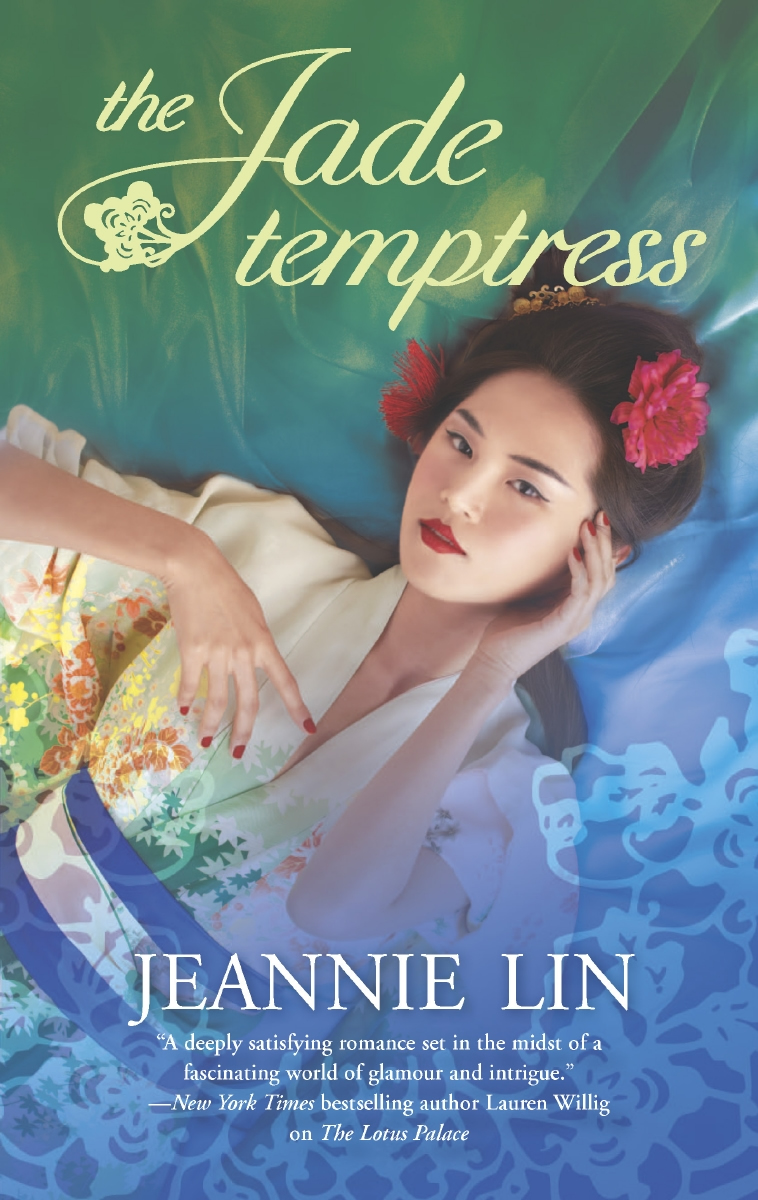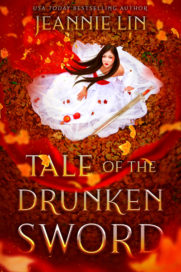Sorry this is late! Had an odd day…but here it is.
If you’re just seeing this, you can see the original version of the opening and the feedback:
Original Opening – 1st post
Thursday I’ll go into what I was trying to address with the revisions.
***
Tang Dynasty China, 824 A. D.
Chapter 1
(First scene remains the same)
***
“Jilted lover,” the cook guessed.
Yan Ling’s eyes grew wide. The stranger had stormed up the staircase only moments earlier with a sword strapped at his side and the glint of murder in his deep-set eyes. She’d leapt out of the path of his charge, just managing to hold onto her pot of tea without spilling a drop.
She stood at the edge of the main room, head cocked to listen for sounds of mayhem upstairs. Her heart raced as she gripped the handle of the teapot. Such violence and scandal were unthinkable in their quiet town.
“Should someone stop him?”
“What? You saw how he was dressed.” Old Cook had his feet in the kitchen, but the rest of him strained as far into the dining area as possible. “Man like that can do whatever he wants.”
“Get back to work,” the proprietor barked.
Yan Ling jumped and the cook ducked his head back through the curtain that separated the main room from the kitchen.
“Worthless girl,” her master muttered as she rushed the pot of tea to its intended table. She pressed her fingers against the ceramic to check the temperature of the pot before setting it down. Cooler than ideal, but still hot enough to not get any complaints.
It was late in the morning and the patrons had thinned, but that was never an excuse to move any slower. Lately it seemed nothing she did was fast or efficient enough. She’d never known any life but the tea house. The story was she’d been abandoned as an infant in the room upstairs, likely the very same one where a new scandal was now unfolding.
She paused to stack empty cups onto a tray. At that moment, the young woman and her companion hurried down the stairs, leaving not even a farewell behind as they swept out the door. Yan Ling expected the sword-carrying nobleman to come chasing after them, but only an uncomfortable silence followed their exit.
The patrons began to whisper among themselves. Her master should be happy. This incident would have the townsfolk lingering over more than a few extra teapots worth of gossip.
When he finally emerged, the gentleman appeared surprisingly calm. He descended the stairs with a steady, powerful stride and his expression was as still as the surface of the moon. Instead of leaving, he marched directly over to the proprietor and flashed an official-looking jade seal. At that point, even the proprietor’s wife flocked over to welcome him. They ushered him to an empty table at the center of the room, nearly breaking their backs bowing with such enthusiasm. Her master shot Yan Ling a sharp look which she knew immediately. Bring tea and fast. She rushed to the kitchen.
“Is there a lot of blood?” the kitchen boy asked as she pushed through the curtain.
“Shush.”
She poured hot water into a fresh pot of leaves and flew back out with her hand around the bamboo handle. Back out in the main room, the stranger didn’t even spare her a glance as she poured the first cup for him.
His robe was of fine woven silk and richly dyed in a dark blue. He wore his thick hair long, the front of it pulled back into a knot in the style of aristocracy. She was stricken by strength of his features; the hard line of his cheekbones and the broad shape of his face which narrowed slightly at the chin.
With a cursory bow, she set down the pot and moved away. There were other tables to tend to and most patrons wanted to drink their tea in peace. Yet her attention kept on wandering back to the stranger. Hours later, he was still seated in the same spot. He wasn’t even drinking his tea anymore. Instead, he had taken to staring into his cup.
Government official, they guessed in the back room, though he traveled without any escort and had a sullen expression that continued to sink lower as the day slipped by. Her guess was that he needed something stronger than tea.
By the end of the day, Yan Ling moved from table to empty table in a restless circle, wash rag in hand, as she wiped away at wooden surfaces rubbed bare from long use. The tea house crowd had dispersed to return to their homes. Only the nobleman remained, still hoarding his cold tea.
As long as he stayed there, she was supposed to attend to him. Her master had made that very clear while he sat comfortably in the corner, tallying up the cash. The wooden beads of his abacus clicked together, signaling that the day should be done.
Her feet ached and no matter how much she wriggled her toes in her slippers, the feeling wouldn’t quite return to them. The clang from the kitchen meant that the cook and his boy were cleaning their pots. A mountain of cups and bowls and little plates would be waiting for her.
Cook tried to get her pry information from the man, but of course she wouldn’t do such a thing. He’d suffered enough public scrutiny that day to deserve some privacy. She guessed him to be twenty-five years. He had a slight crease between his eyes that she imagined came more from deep contemplation than age, and she was beginning to feel for him. After his initial rage, he handled his grief with such dignity and bearing.
Gingerly, she approached the table. “Does the honored guest need anything?”
She reached for the clay tea pot only to have him wave her back with an irritated scowl. For a gentleman, he was uncommonly rude, but she supposed wearing silk and jade gave him that privilege. He propped his elbows onto the table, shoulders hunched to return to his vigil. From the emptiness of his stare, the young woman had to have been someone close to him. His wife? But no man would let his wife escape with a lover after catching them together.
Yan Ling turned to wipe down her already cleaned table once more when the stranger spoke.
“I need a woman,” he mumbled. “Any woman would do.”
Her stomach dropped. She swung around, her mouth open in shock. The stranger raised his head. For the first time, his eyes focused on her, looking her up and down.
“Perhaps even you.”
Any sympathy she might have had for him withered away. If his tone had been leering, or his look more appraising, it might have been less offensive. But the coldly pensive way he’d said it along with the addition of ‘perhaps’ as if to plunge her worth even further-Yan Ling grabbed the teapot and flung the contents onto the scoundrel.
The stranger shot to his feet with a curse. With a choked cry, her master jumped up from his table and his wife soared like a windstorm from the kitchen, apologizing profusely. Even the cook and his boy were gawking through the curtained doorway.
“Get out!” The master’s wife shrieked at Yan Ling before turning to fuss at their precious patron. The front of his expensive robe was stained dark with a splatter of tea.
“We are so sorry, my lord,” she crooned. “So sorry.”
Yan Ling clutched the tea pot between both her hands while she stared.
The nobleman swiped the tea leaves away in one angry motion while his eyes remained fixed onto her. He had lost that distant, brooding expression he’d worn all day. The look he gave her was possibly worse than the one she’d seen as he’d charged up the stairs. Heat rose up her neck as she stumbled back.
What had she done?
“That know-nothing, good for nothing girl,” her master railed.
Her ears rang as she ducked into the kitchen through the beaded curtain. Steam enclosed her, but the clang of the pots couldn’t block the nobleman’s deep voice as he complained about such disrespect. She could hear her master and his wife agreeing wholeheartedly.
It wasn’t as if she hadn’t been taunted before, but over the last years the teasing had taken on a different tone as her bone-thin figure had curved its way into womanhood. She’d learned to deafen her ears and stare ahead, never meeting any of the not-so-subtle glances thrown her way. Yet to suffer such insult from someone who appeared so refined. It was unbearable.
Ignoring the curious stares from cook and the kitchen-boy, she slipped through the back door. Her palms were damp and she wiped them restlessly against the sides of her gray tunic. Fear set her heart skittering.
The tea house was where she’d lived all her life, but it was not home. The proprietor and his wife were not father and mother. This had always been clear to her and she’d had to earn her bed, this roof, and every meal with service and obedience.
One moment of hot-headedness. She’d lashed out at a well-dressed nobleman, of all people. She wasn’t even a servant when it came to this man. She was the humble servant of humble servants. Who was she to be outraged? She wasn’t allowed it.
She would certainly be scolded by both master and mistress, each separately and then together. Yan Ling could hear them already. She had become too much of a burden to feed, to clothe. She wasn’t even pretty enough to bring in more customers. They might even be angry enough to take a bamboo switch to her.
A beating was all she’d have to suffer, if she was lucky.
***
Now, I don’t mean to get a complex, but our joint critique is up for $2.00 at Brenda Novak’s auction. That’s less than a Starbucks.
Edited to add: Apparently someone bid since last I checked, so it’s now up to $15.00. I’ll make it worth your while, promise. 😉





